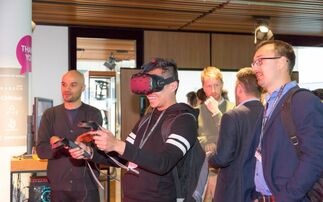
Accelerated innovation brings amazing improvements and new possibilities, but has also led to overload and unwelcome operational complexity
In a Digital Everything world, how can we do more for our customers without losing ourselves? And how can we use technology to help make us more human?
Remember when your workday looked like the one booked in your calendar?
It probably wasn't that long ago. Before the pandemic, technology advanced at what felt like a manageable pace. But today, no schedule survives first contact with the inbox. Data is overwhelming - we have more information but less knowledge. Real-time has become 'all the time,' and customer patience can now be measured in seconds.
Welcome to the world of Digital Everything, where software is woven into countless business processes from HR to legal, supply chains, and more. But while accelerated innovation brings amazing improvements and new possibilities, it has also led to overload and unwelcome operational complexity for today's knowledge worker.
Digital Everything empowered us with access and convenience, yet blew up the structure and neatness of our calendared lives. In short, we broke work.
Why work is broken
Roughly 47 million people quit their jobs this past year - equivalent to about the size of the entire population of Argentina. While hybrid or permanent at-home work is flexible, it also makes it harder to maintain boundaries. It's no wonder then that 60% of workers last year reported negative impacts of work-related stress, including physical fatigue.
Much of this is happening because our current management and ticketing tools no longer serve customers or knowledge workers themselves, as these tools rely heavily on humans to identify and prioritise work (not easy to do when drowning in data). The noisiest problems get surfaced first, making the important signal a needle in a haystack. Even worse, work becomes mundane, creating friction instead of empowering innovation.
But not all hope is lost. We know that teams who are more proactive and predictive - who are more mature or progressed on their digital operations journey - are overall healthier, happier and more engaged. There is a way out, one that puts technology in service of people, not people in service to technology.
Yes, we broke work - but it's not too late to fix.
Technology that empowers people
Human attention should be spent making sense of data, not mindlessly munging at the expense of customer relationships. In other words, we need to offload to machines if we are to advance, not to mention hold on to our sanity.
For example, at PagerDuty, we have seen event data grow at nearly 3x the rate of users. That's right - data from events is outpacing humans. And with looming inflation and a tight labour market, humans are becoming more expensive, which means organisations must get more efficient about processing all these events.
Don't worry, this isn't some Terminator-like wish fulfillment. Our vision is one where AI-powered digital automation management doesn't replace but rather elevates humans by giving them tools to make better decisions. When you reduce data overload and operational complexity - when technology empowers people and not the other way around - you can do more fulfilling and forward-looking tasks.
Developer-led, user-first
Through every new product or feature release, our goal is to empower people to make hard, disruptive issues easier to resolve. Our Operations Cloud has emerged as the go-to platform where mission-critical, time-sensitive operations are concerned.
Operations Cloud empowers today's knowledge worker by:
- Using AI to help teams diagnose and action time-critical issues quickly
- Automating more and more of the toil
- Intelligently orchestrating work to the right teams
- Filtering out noise so you focus on the right stuff
- Learning with every event
We've all faced new challenges over the past few years. It hasn't been easy - but it no longer needs to be hard, either. We can fix the way we work, use automation to save time and give us more space to focus, and face our new Digital Everything world with confidence.



















